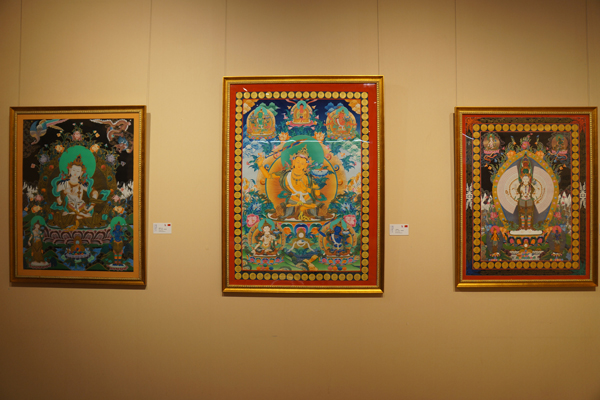Nepali Thangka exhibition held in Beijing
- By Wu Jin
 0 Comment(s)
0 Comment(s) Print
Print E-mail China.org.cn, September 24, 2014
E-mail China.org.cn, September 24, 2014
Fifty Thangka paintings from Nepal have been exhibited at the Capital Library of China since September 23, 2014.
 |
|
A typical example of Nepali Thangka Painting [Photo by Wu Jin/China.org.cn] |
The exhibition, entitled "Thangka Painting: A Symbol of Friendship across the Himalayas," is part of the cultural exchange between China and Nepal.
Dipak Chandra Amatya, Minister of Culture, Tourism and Civil Aviation in Nepal said that shared Buddhist culture has bonded the two neighboring countries closely, especially along the Silk Road, and a strong friendship between China and Nepal continues to this day.
Home to Lumbini, the birth place of Gautama Buddha, the introduction of Nepalese Thangka painting to China's Tibet occurred when princess Bhrikuti married King Songtsan Gampo of Tibet in the 7th Century AD.
Modern cultural cooperation has been enhanced since 2003, when China opened its first cultural exhibition in Nepal. Five other ensuing exhibitions, named the China Festival, have been successively held over the past several years.
Zhao Dawu, who visited Nepal recently with a Chinese artists' delegation, said, "Chinese culture has always been mysterious to many Nepali people, who know China only through Tibet. But with more Chinese tourists visiting the country, Nepali people are now getting increasingly interested in Chinese culture."
Now it's Nepal's turn to promote its culture to Chinese citizens.
"Even in Beijing, for so many years we haven't had the opportunity to witness so many distinguished and significant Thangka paintings in Beijing," said Ding Wei, Deputy Cultural Minister of China.
Steeped in Buddhist mythology and sacredness, the Thangka exhibition, which will run until Sept. 27, has attracted a number of Beijing audiences since it opened.
"From the paintings, I feel a kind of superb energy that could be attributed to the power of Buddhism," said Gao Zhenguo, consultant from the Research Center of Regimen Culture at Peking University.






Go to Forum >>0 Comment(s)